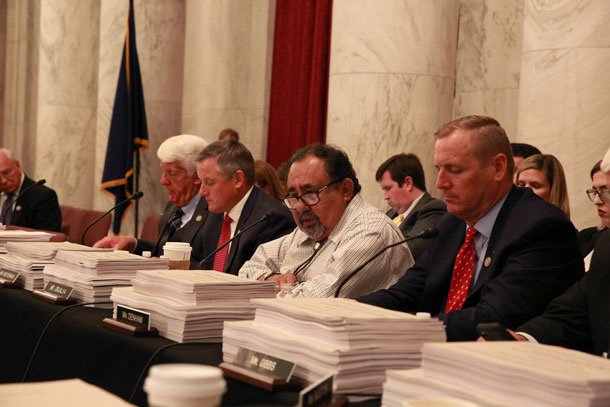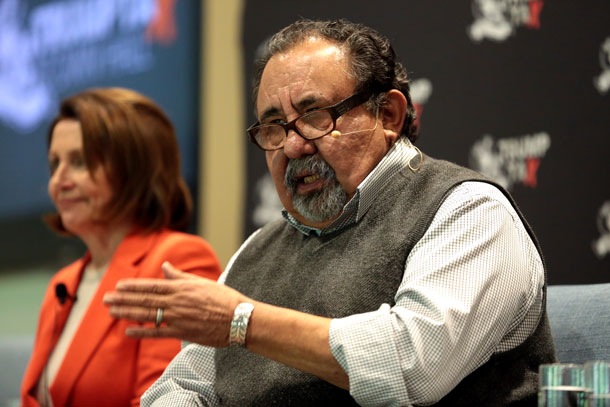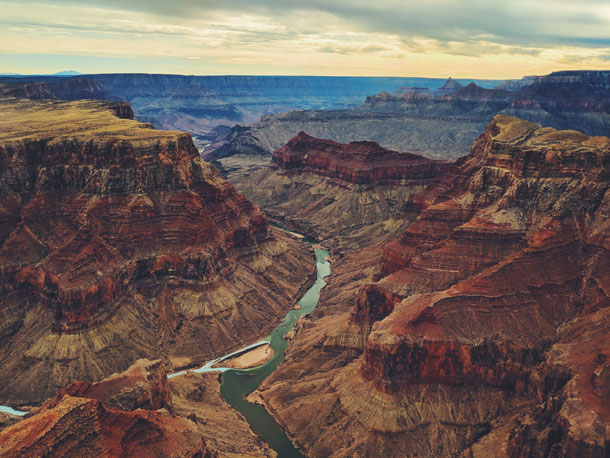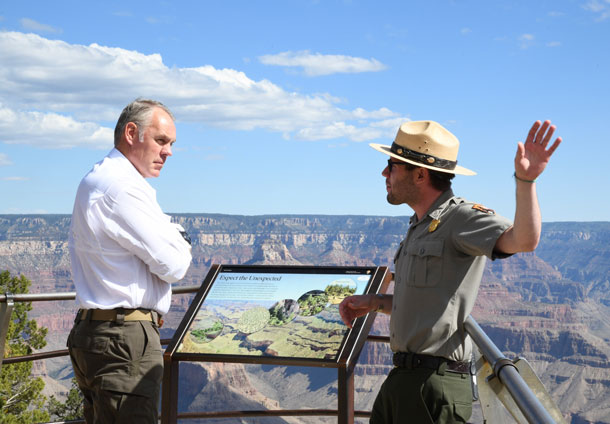Defending Public Lands
Air Date: Week of January 18, 2019

US Rep. Raúl Grijalva (D-AZ) (center) delivered remarks at a Farm Bill hearing in September 2018. (Photo: Flickr CC BY-NC-ND 2.0)
Rep. Raúl Grijalva (D-AZ) now chairs the House Natural Resources Committee and pledges to defend public lands, endangered species and Native Americans and work to keep fossil fuel deposits owned by the public in the ground. With the new House Democratic majority behind him he also plans to challenge the Trump Administration and probe why former Secretary of the Interior Ryan Zinke decided to shrink Bears Ears and Grand Staircase-Escalante National Monuments in a way that benefits coal and uranium interests. Rep. Grijalva also told host Steve Curwood the committee will address climate change, strengthen fisheries management, and bring science back to federal agency decisions.
Transcript
BASCOMB: From PRI and the Jennifer and Ted Stanley Studios at the University of Massachusetts Boston, this is Living on Earth. I’m Bobby Bascomb.
CURWOOD: And I’m Steve Curwood.
Now that the Democrats are in the majority in the US House, the important committee chairs are far more diverse. For example, Arizona Democrat Raul Grijalva is the son of a Mexican farm worker who came to the US through the bracero guest worker program back in the 1940’s. And now after winning his ninth term in Congress he is back in power as chair of the potent House Committee on Natural Resources. He is also the first vice president of the Congressional Hispanic Caucus and co-chair of the Congressional Progressive Caucus. As chair of Natural Resources, Raul Grijalva oversees and holds the purse strings for a broad portfolio of government operations including public lands, mineral resources, species protection and Native American relations. Congressman Grijalva joins us now from his office on Capitol Hill. Mr Chairman, welcome to Living on Earth!
GRIJALVA: Thank you very much. Appreciate the opportunity.
CURWOOD: So you've been in Congress now -- you're in your ninth term. And I believe through pretty much all of this, you've been concerned about natural resources. Why?
GRIJALVA: Well, when I got here, I asked for two committees, natural resources, and education and the workforce, always feeling that they were both very critical committees that unfortunately, they're not considered a top tier exclusive committee. But in terms of the issues that we confront in resources, they're vital, they're important, and I've stuck with it. And through time, and I hope some hard work, I now have the opportunity to lead this committee, and I'm very much looking forward to the opportunity. Somewhat daunting, to say the least given who we're dealing with in this administration, and what has gone on the last two years, but nevertheless, an opportunity to right some wrongs and maybe start to steer the ship in a different direction.
CURWOOD: So tell me, what's your number one priority as you take the helm of the House Committee, or maybe you have a couple of priorities you want to mention?

Rep. Grijalva (D-AZ) is Chair of the House Natural Resources Committee. (Photo: Gage Skidmore, Flickr CC BY-SA 2.0)
GRIJALVA: We need to demand accountability, we need to demand oversight, and we need to deal with intended and unintended consequences of the decisions that are being made by this administration internally, with regards to our public lands, our oceans, and all the areas that we have under jurisdiction, from Puerto Rico to indigenous people here in the US. So all the tribal issues that come before us, we have full jurisdiction. And one of the oversight issues that we want to look at is how this administration, and in particular Interior, has suppressed and tried to dumb down the role of science and fact in our decision making. And that applies to climate change. And that applies to species, habitats, water and our public lands. And so raising science once more to the central role, core role that it plays in decision making, especially on this committee, I think is one of the goals.
CURWOOD: The now former Secretary of the Interior Ryan Zinke is out; to what extent is your committee going to look into a number of the decisions that he made? How much of a priority is that now?
GRIJALVA: There's a culture in Interior, a culture that has put oil, gas, extraction industries above any other consideration for our lands, our waters. Mr. Zinke is part of the creation of that culture along with Trump. And so any decision that was made in the last two years, of which Mr. Zinke was -- if not the architect, certainly the functionary for those decisions -- they're open for our scrutiny. We think Bears Ears’ shrinkage and Escalante-Staircase shrinkage, of those monuments are the most apt example of this philosophy of anything goes as long as we are satisfying the interest of those industries. And so we're going to get to how that decision was made. We asked for that information when we were in the minority. Now, we have other legal options to insist to get that information. And Secretary Zinke, either voluntarily or involuntarily, will have to come before this committee and explain how he reached those conclusions and explain to us why it seems that the decisions around there were made to satisfy the mining industry particularly around coal and uranium, and those two monuments at the expense of all the other work that had been done.

The House Natural Resources Committee has oversight jurisdiction over the nation’s public lands, including its national parks. Grand Canyon National Park, shown here, is in Rep. Grijalva’s home state of Arizona. (Photo: Sonaal Bangera on Unsplash)
CURWOOD: Now, what about the Magnuson-Stevens Act? Now that governs fisheries, both their conservation and management, and I understand that this is a key agenda item for the Natural Resources Committee. Why?
GRIJALVA: I think the discussion in the past when we were in the minority was tilted and many protections that were in about what safe yield is, and the effects of climate change that are going on in the oceans was not factored in at all in those discussions. That is now critical, because as the oceans change, and the life cycle changes for the species, we have to be able to respond to that. And I think by just completely ignoring it, the problem is just going to get worse and worse. So almost anything we do, we're going to have a lot of hearings, and one of them is going to be in that subcommittee, but every subcommittee from Indigenous Peoples of the US subcommittee, to Public Lands subcommittee, to Energy and Power subcommittee, to Oversight, are all going to integrate the issue of climate change and the social and economic costs of not dealing with the question.
CURWOOD: And, I imagine you'll be working then with the Climate Crisis Select Committee?
GRIJALVA: Oh, absolutely. I think hopefully, some joint hearings can occur. But, in our area of jurisdiction, which is pretty vast, these plans have been talked about for many, many years. So we're just going to proceed and coordinate with that committee and make sure that this is not about competition; the more light, the more public understanding and perception we can build around the issue of climate change, and its effect on everyday people and everyday species, regardless, the better off we're going to be. So yeah, we have to coordinate, I think that's all part of it.

Former Secretary of the Interior Ryan Zinke, seen here with a ranger on a visit to Grand Canyon National Park in September 2018, resigned in December 2018 amid inquiries into his alleged ethical violations. Rep. Grijalva has promised to use his authority as Chair of the House Natural Resources Committee to investigate these alleged ethical lapses. (Photo: U.S. Department of the Interior, Flickr CC BY-SA 2.0)
CURWOOD: You mentioned that it's been a lot of talk about this, what about action? What can be done right now? Of course, you have a Republican Senate, you have Mr. Trump in the White House, you do have the majority now back in the House, what can be done right now to address these issues that you are bringing up?
GRIJALVA: I think at the House level I anticipate we're going to pass some good laws. Magnuson is one that you mentioned. Mining reform, that needs to happen, the only extraction industry that doesn't pay one penny royalty for whatever they take out of the ground and public lands. Then the list goes on, no mitigation fund from the mining industry to take care of abandoned and orphaned mines that are causing problems and dangers throughout the West. And we're going to have significant legislation that profiles and uplifts the needs of Indigenous people here in the United States, tribes that have not been listened to well, the last two years in particular. And so we have a lot of action items that we’ll have. The question I think that people ask -- so you pass it, it goes to the Senate, it goes into some abyss, and it's never heard of again. Or the Senate does something right, and passes something that the House wanted, and it goes to the President, he vetoes. Nevertheless, I think we have a responsibility to the people that gave us this majority to pass that kind of legislation to begin to set the template for 2020. I do feel that we, and Nancy Pelosi knows that, that we have a powerful tool and that's the budget. And from that I think we will be able to negotiate with our Republican colleagues, both in the Senate and the House, changes to the further protect environmental issues, to deal with climate change, because we control the budget.
CURWOOD: Congressman Raúl Grijalva represents Arizona's third district and is the chair of the House Committee on Natural Resources. Congressman, thanks so much for taking the time with us today.
GRIJALVA: Anytime. Thank you very much.
Links
About the House Natural Resources Committee
Listen to our interview with the Chair of the new House Select Committee on the Climate Crisis
NYTimes | “Ryan Zinke, Face of Trump Environmental Rollbacks, Is Leaving Interior Department”
Living on Earth wants to hear from you!
Living on Earth
62 Calef Highway, Suite 212
Lee, NH 03861
Telephone: 617-287-4121
E-mail: comments@loe.org
Newsletter [Click here]
Donate to Living on Earth!
Living on Earth is an independent media program and relies entirely on contributions from listeners and institutions supporting public service. Please donate now to preserve an independent environmental voice.
NewsletterLiving on Earth offers a weekly delivery of the show's rundown to your mailbox. Sign up for our newsletter today!
 Sailors For The Sea: Be the change you want to sea.
Sailors For The Sea: Be the change you want to sea.
 The Grantham Foundation for the Protection of the Environment: Committed to protecting and improving the health of the global environment.
The Grantham Foundation for the Protection of the Environment: Committed to protecting and improving the health of the global environment.
 Contribute to Living on Earth and receive, as our gift to you, an archival print of one of Mark Seth Lender's extraordinary wildlife photographs. Follow the link to see Mark's current collection of photographs.
Contribute to Living on Earth and receive, as our gift to you, an archival print of one of Mark Seth Lender's extraordinary wildlife photographs. Follow the link to see Mark's current collection of photographs.
 Buy a signed copy of Mark Seth Lender's book Smeagull the Seagull & support Living on Earth
Buy a signed copy of Mark Seth Lender's book Smeagull the Seagull & support Living on Earth

